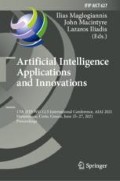Abstract
This paper presents the development of regression and classification algorithms to predict greenhouse gas emissions caused by the building sector, and identify key building characteristics, which lead to excessive emissions. More specifically, two problems are addressed: the prediction of metric tons of CO2 emitted annually by a building, and building compliance to environmental laws according to its physical characteristics, such as energy, fuel, and water consumption. The experimental results show that energy use intensity and natural gas use are significant factors for decarbonizing the building sector.
Access this chapter
Tax calculation will be finalised at checkout
Purchases are for personal use only
References
Zhao, H.-X., Magoulès, F.: A review on the prediction of building energy consumption. Renew. Sustain. Energy Rev. 16(6), 3586–3592 (2012)
Kontokosta, C.E.: Energy disclosure, market behavior, and the building data ecosystem. Ann. New York Acad. Sci. 1295(1), 34–43 (2013)
Fan, C., Xiao, F., Li, Z., Wang, J.: Unsupervised data analytics in mining big building operational data for energy efficiency enhancement: a review. Energy Build. 159, 296–308 (2018)
Yang, J., et al.: k-Shape clustering algorithm for building energy usage patterns analysis and forecasting model accuracy improvement. Energy Build. 146, 27–37 (2017)
Papadopoulos, S., Bonczak, B., Kontokosta, C.E.: Pattern recognition in building energy performance over time using energy benchmarking data. Appl. Energy 221, 576–586 (2018)
Baker, K.J., Rylatt, R.M.: Improving the prediction of UK domestic energy-demand using annual consumption-data. Appl. Energy 85(6), 475–482 (2008)
Gaitani, N., Lehmann, C., Santamouris, M., Mihalakakou, G., Patargias, P.: Using principal component and cluster analysis in the heating evaluation of the school building sector. Appl. Energy 87(6), 2079–2086 (2010)
Lara, R.A., Pernigotto, G., Cappelletti, F., Romagnoni, P., Gasparella, A.: Energy audit of schools by means of cluster analysis. Energy Build. 95, 160–171 (2015)
Mena, R., Rodríguez, F., Castilla, M., Arahal, M.R.: A prediction model based on neural networks for the energy consumption of a bioclimatic building. Energy Build. 82, 142–155 (2014)
Seyedzadeh, S., Rahimian, F., Glesk, I.Roper, Roper, M.: Machine learning for estimation of building energy consumption and performance: a review. Vis. Eng. 6(1), 5 (2018)
Waseem, A.M., Mourshed, M., Rezgui, Y.: Trees vs neurons: comparison between random forest and ANN for high-resolution prediction of building energy consumption. Energy Build. 147, 77–89 (2017)
Pombeiro, H., Santos, R., Carreira, P., Silva, C., Sousa, J.M.C.: Comparative assessment of low-complexity models to predict electricity consumption in an institutional building: Linear regression vs. fuzzy modeling vs. neural networks. Energy Build. 146, 141–151 (2017)
Dong, B., Cao, C., Lee, S.E.: Applying support vector machines to predict building energy consumption in tropical region. Energy Build. 37(5), 545–553 (2005)
Jain, R.K., Smith, K.M., Culligan, P.J., Taylor, J.E.: Forecasting energy consumption of multi-family residential buildings using support vector regression: Investigating the impact of temporal and spatial monitoring granularity on performance accuracy. Appl. Energy 123, 168–178 (2014)
Solomon, D., Winter, R., Boulanger, A., Anderson, R., Wu, L.: Forecasting energy demand in large commercial buildings using support vector machine regression (2011)
Christantonis, K., Tjortjis, C., Manos, A., Filippidou, D.E., Christelis, E.: Smart cities data classification for electricity consumption & traffic prediction. Autom. Softw. Eng. 31(1) (2020)
Mystakidis, A., Tjortjis, C.: Big data mining for smart cities: predicting traffic congestion using classification. In: Proceedings of 11th IEEE International Conference on Information, Intelligence, Systems and Applications (IISA 20) (2020)
Christantonis, K., Tjortjis, C., Manos, A., Filippidou, D.E., Mougiakou, E., Christelis, E.: Using classification for traffic prediction in smart cities. In: 16th International Conference on Artificial Intelligence Applications and Innovations (AIAI 20) (2020)
Kontokosta, C.E., Tull, C.: A data-driven predictive model of city-scale energy use in buildings. Appl. Energy 197, 303–317 (2017)
Hong, S.-M., Paterson, G., Mumovic, D., Steadman, P.: Improved benchmarking comparability for energy consumption in schools. Build. Res. Inf. 42(1), 47–61 (2014)
Santamouris, M., et al.: Using intelligent clustering techniques to classify the energy performance of school buildings. Energy Build. 39(1), 45–51 (2007)
Gao, X., Malkawi, A.: A new methodology for building energy performance benchmarking: an approach based on intelligent clustering algorithm. Energy Build. 84, 607–616 (2014)
Wen, L., Yuan, X.: Forecasting CO2 emissions in Chinas commercial department, through BP neural network based on random forest and PSO. Sci. Total Env. 718, (2020)
Wu, Y., Sharifi, A., Yang, P., Borjigin, H., Murakami, D., Yamagata, Y.: Mapping building carbon emissions within local climate zones in Shanghai. Energy Procedia 152, 815–822 (2018)
Energystar.gov. https://www.energystar.gov/buildings/facility-owners-and managers/existing-buildings/use-portfolio-manager/understand-metrics/difference
Acknowledgments
The authors would like to thank the Hellenic Artificial Intelligence Society (EETN) for covering part of their expenses to participate in AIAI 2021.
Author information
Authors and Affiliations
Corresponding author
Editor information
Editors and Affiliations
Rights and permissions
Copyright information
© 2021 IFIP International Federation for Information Processing
About this paper
Cite this paper
Avramidou, A., Tjortjis, C. (2021). Predicting CO2 Emissions for Buildings Using Regression and Classification. In: Maglogiannis, I., Macintyre, J., Iliadis, L. (eds) Artificial Intelligence Applications and Innovations. AIAI 2021. IFIP Advances in Information and Communication Technology, vol 627. Springer, Cham. https://doi.org/10.1007/978-3-030-79150-6_43
Download citation
DOI: https://doi.org/10.1007/978-3-030-79150-6_43
Published:
Publisher Name: Springer, Cham
Print ISBN: 978-3-030-79149-0
Online ISBN: 978-3-030-79150-6
eBook Packages: Computer ScienceComputer Science (R0)


